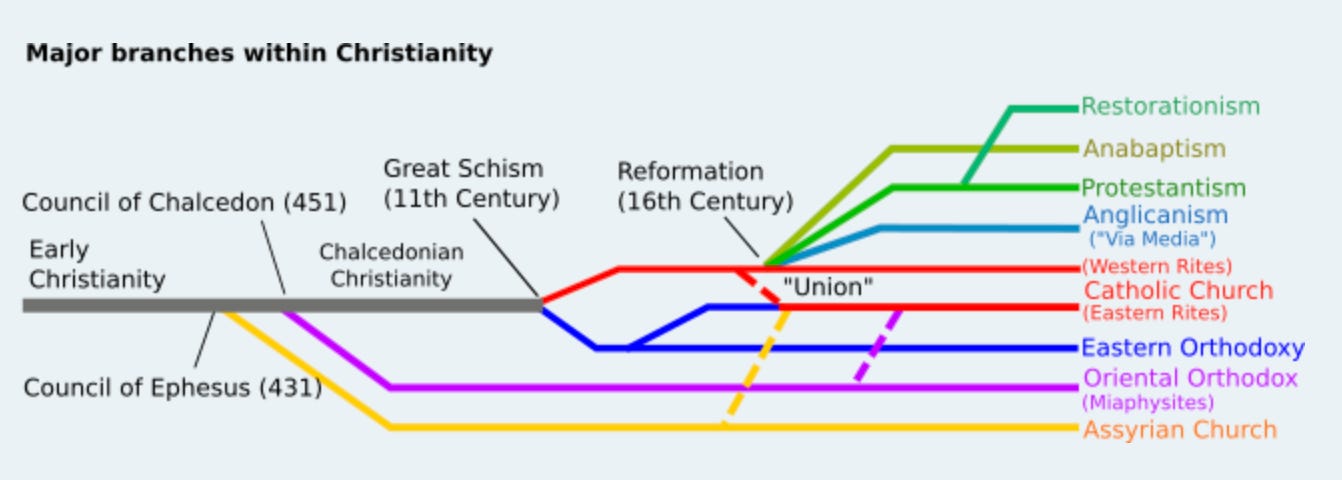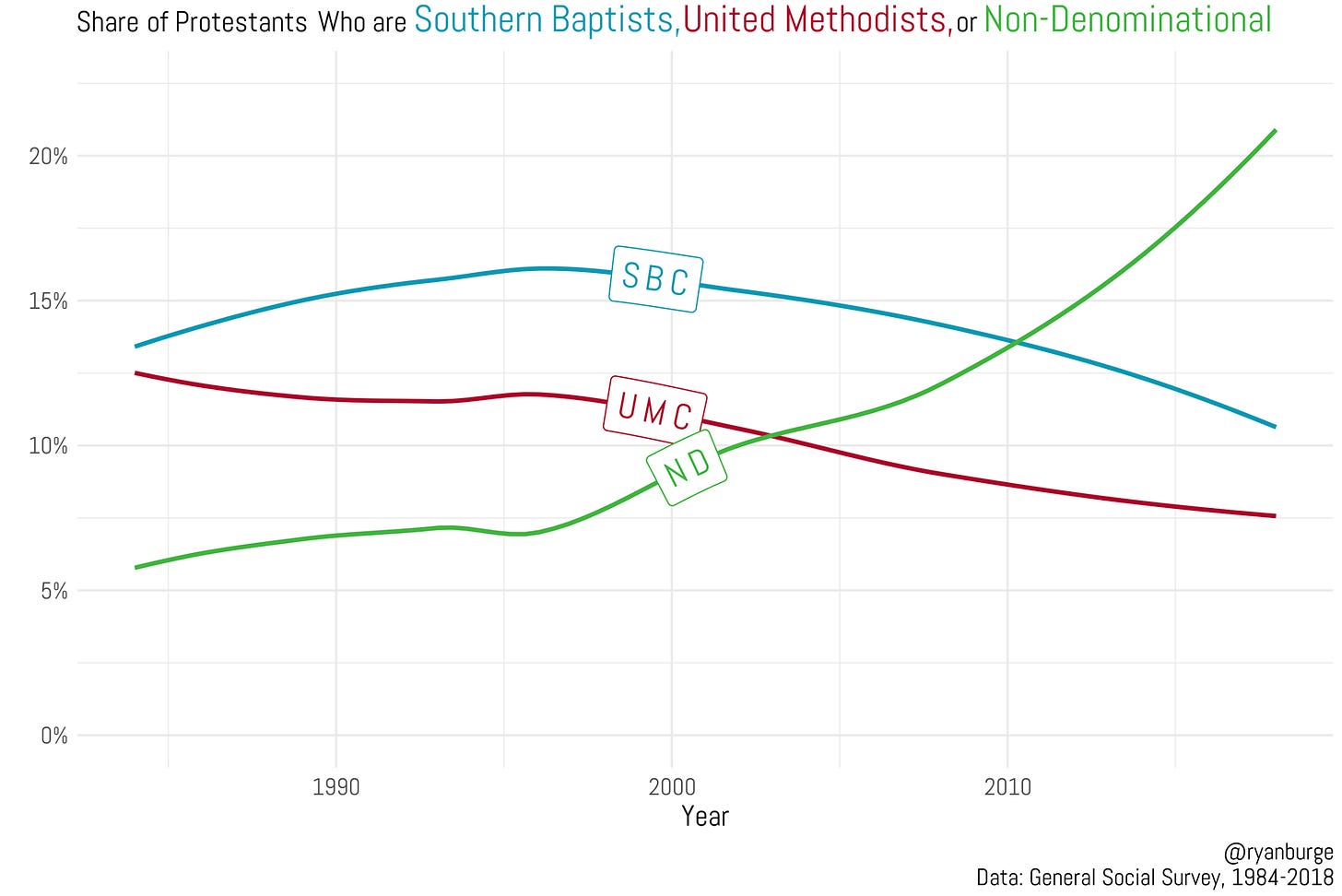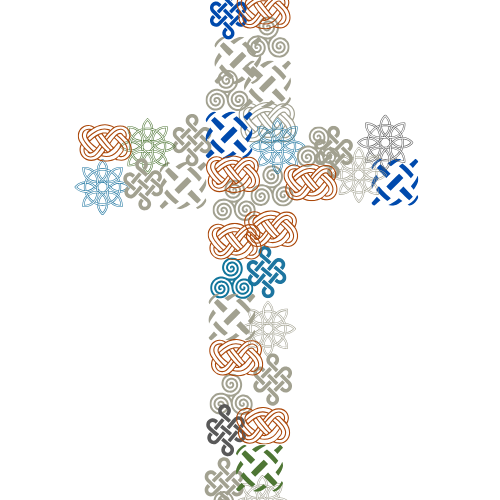Do denominations still matter?
an invitation into a 'post-denominational' Lent

It was 20 years or so ago, at a clergy conference. I was still a pretty newly-minted Episcopal priest, and the conference speaker was a well-know bishop in the denomination. I was thrilled to be talking with him at the reception after his talk, and he said something about Christian communities being called into deeper relationship with each other. “But what about denominations?” I asked.
”Denominationalism is a sin.”
He said this forcefully, and I was taken aback. Shocked, really. First, because here he was - a denominational authority, at a completely sectarian gathering!
Then because it felt like such a transgressive thing to say. Are we allowed to say there shouldn’t be denominations? In my very green state as a priest I felt sure someone was going to give me a demerit just for considering such things!
But after my shock, I fell into a deep curiosity that has persisted until today.
I had literally never considered that Christianity existed in any way except by denomination - what branch of the faith we were raised in or joined. I was a Roman Catholic child of the 1970s - when nondenominational Christianity was virtually unheard of (also, everyone I knew was Roman Catholic then, so I was still struggling to understand what it meant to be ‘Protestant’…). Then I joined the Episcopal Church and it almost immediately became the center of my life. My perspective on other denominations was definitely skewed.
What I knew about denominations is that pretty much everyone picked a ‘team’, and that team shaped your views and guided your formation as a Christian.
Not being part of a ‘team’ and still calling yourself a Christian seemed suspect to me. What did they believe then? Who decided? If they didn’t do it ‘right’, would they get in trouble?
Flash forward to today. Deep into the 21st century. I’m still an Episcopal priest (with less than 5 years till retirement, so I feel a little less like I’m going to get in trouble for questioning things…).
I’m in my tenth year of being ‘Free Range’, and I also still serve a (fabulous) small congregation. I’m intensely interested in the future of church, mostly because I feel the changes in the air all around us, and I think we need to find and follow Jesus in new ways because of them.
Here’s one thing I’ve noticed: people don’t care about denominations anymore. Certainly people outside the church don’t (do not even get me started on all (most) of the people who’ve never heard the word ‘Episcopalian’. I have to spell it a lot when I’m giving my occupation for things…).
People inside church don’t care as much as I once thought, either.
When I say this, people often object. But then I say to them:
If you moved to another town, and the Episcopal (or Lutheran or Methodist, etc.) church in that town was:
a) not welcoming to you
b) did not worship in the same style you were used to
and/orc) seemed to have a political bent that made you uncomfortable,
you would go to another church that fit those criteria, regardless of which denomination it was.
I’ve never once had a person disagree with that statement.
Indeed, lots of our parishioners would be hard-pressed to explain the differences between the denominations.
Here’s where I usually get more pushback: there are many wonderful things about the various Christian traditions. We can’t abandon them.
I could not agree more.
I love Episcopal liturgy - our worship is what most defines us as a denomination. Whenever I officiate a wedding, I tell the couple that we were the ones who wrote those vows, the ones we all know from the movies (‘in sickness and in health, till death do us part’.) I’ll die with a Book of Common Prayer in my hand.
Each denomination has its own unique culture of the faith. And denominations do give us structure and authority, doctrines and habits and traditions around how we are the church.
Yet they are also born of division - this group is leaving that group, often bitterly.
I think that’s what the long-ago bishop was getting at.
And sometimes our structure and authority - not to mention our heavy bureaucracy - can get in the way of sharing the faith.
And most importantly:
MOST people are finding their way to Jesus beyond denominations.
Ryan Burge (who’s blog ‘Graphs about Religion’ is a daily read for me), just published an article called ‘Non-denominationalism is the strongest force in America’. In it are nested several other articles, including one called ‘Just How Bad is Denominational Decline?’ (spoiler alert: very bad).
In the past 50 years in the US, non-denominational Christianity has gone from being just a blip (3% in 1972) to nearly 13% of all Christians today (to put this in perspective, less than 1% are Episcopalian, about 22% are Roman Catholic).
Denominations have never meant less to those who want to follow Jesus.

I personally don’t want to see denominations disappear. I love the variety and the tradition of the specific ways we follow Jesus.
And I think it’s not up to us. The world is changing. The culture is changing. The church is changing.
If we want to share the Gospel, we have to be prepared to live in a ‘post-denominational’ world.
Which means, to me, not that we abandon our differences, but that we find our commonalities. That we partner more in ways we share the faith - maybe less focus on worship and political differences, and more on discipleship and formation.
With all this in mind, I am trying an experiment. With my colleague Carrie Craig (who’s also an Episcopal priest!), I’m starting a set of Christian Spiritual Exercises called ‘Your Life with God’. I like to call it a ‘gym for your soul’.
It’s meant to be a way learn about and practice the faith, that is not tied to a particular way of being Christian. You can follow YLWG online as an individual, or use it as faith formation with your congregation. You can participate online, or be part of a ‘chapter’.
If you are a paid subscriber to Free Range Priest, you’ve been given a 3-month free subscription to YLWG, so you can join us for Lent (paid FrP subscribers are automatically subscribed. You can unsubscribe at any time).
We’re going to practice ‘confession’ during this season of preparation. The theme of the Exercises is:
‘God loves you just the way you are. And God loves you too much to let you stay that way.’
Join us for your Lenten discipline. And join us to practice ‘post-denominational’ Christianity, no matter what your actual denomination (if any)!




Fr. Cathie, I had an eye-opening experience last year when I joined the staff of an American Baptist church for five months in a supporting role. I handled pastoral ministry and preached once a month. They loved having an Episcopal priest around and I learned to appreciate a very Protestant way of worship on a Sunday morning. More than a few mentioned that they appreciated my shorter sermons than the pastor and associate usually gave. But beyond my liturgical background and their very low-church style we shared a common ministry to the poor, the hungry and immigrant in our community, the LGBTQA+ community and just helping to make our community a better place to live -- because we all believe God is calling us to do just that.
Hi Cathie - I think you are correct to want to both maintain denomination and shed it. For those new to the Episcopal Church, I find great meaning in the weekly Eucharist. Maintain. But I note a weakness, even illiteracy, with the Bible. Keep & improve. “But we read 3 scriptures plus the Psalms every week,” says a veteran member. True, but they lack context when presented over Three years. Preaching could improve, I think. How do we give up denominations and maintain practice and focus on what we do well?